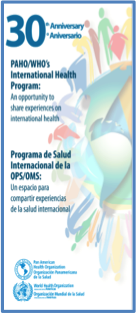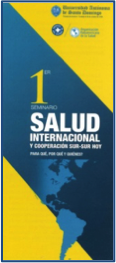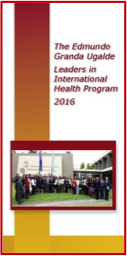NEWSLETTER QUICK ACCESS TO CONTENT
 The International Health Bulletin is a publication developed by the Edmundo Granda Ugalde Leaders in International Health Program (LIHP) of the Pan American Health Organization/World Health Organization (PAHO/WHO). The purpose of the Bulletin is to contribute to the dissemination of information on international health issues among Program participants and other relevant actors who work in the areas of public health and international relations, enabling them to learn more about the LIHP, as well as relevant issues and opportunities related to international health. The International Health Bulletin is a publication developed by the Edmundo Granda Ugalde Leaders in International Health Program (LIHP) of the Pan American Health Organization/World Health Organization (PAHO/WHO). The purpose of the Bulletin is to contribute to the dissemination of information on international health issues among Program participants and other relevant actors who work in the areas of public health and international relations, enabling them to learn more about the LIHP, as well as relevant issues and opportunities related to international health.
In recognition of the 30th anniversary of PAHO’s International Health Program, this issue of the Bulletin includes an article and links to the Webcast of the commemorative event that was held in Lima, Peru earlier this year. The issue also focuses on one of the LIHP’s modules, namely, that of Climate Change, Development and Health. The article, written by the module coordinator, Dr. Marilyn Aparicio, highlights the objectives and main contents of the module as well as illustrates the application of the module content to two LIHP projects. This issue also includes information about the LIHP 2014 and 2015 cohorts as well as upcoming events in the field of international health and discusses some accomplishments of two training initiatives in international health in El Salvador and the Dominican Republic.
 The year 2015 marks the 30th anniversary of PAHO’s International Health Program, celebrating three decades of cooperation with the countries of the Region. To date, over 500 persons from 40 countries in the Americas have participated in the Program, either in its previous onsite version in Washington, D.C. or its current decentralized modality offered through the Virtual Campus for Public Health (VCPH). Graduates contribute to the advancement of health in the Region as leaders and change agents within ministries, universities, international organizations, sub-regional integration organisms, non-governmental organizations, among others. The year 2015 marks the 30th anniversary of PAHO’s International Health Program, celebrating three decades of cooperation with the countries of the Region. To date, over 500 persons from 40 countries in the Americas have participated in the Program, either in its previous onsite version in Washington, D.C. or its current decentralized modality offered through the Virtual Campus for Public Health (VCPH). Graduates contribute to the advancement of health in the Region as leaders and change agents within ministries, universities, international organizations, sub-regional integration organisms, non-governmental organizations, among others.
The anniversary event was held on 25 May 2015 in Lima, Peru. Approximately 60 people were in attendance including Program graduates from Peru, current LIHP participants, professionals from the Peruvian Ministry of Health, PAHO/WHO country office staff, as well as virtual participants. In addition, many other individuals took part virtually from other countries. A highlight of the event was the keynote address on International health: a vision from Peru provided by Dr. Aníbal Velásquez, Minister of Health of Peru and graduate of the LIHP. Activities also included a presentation on global health diplomacy by Dr. Thaísa Lima from the Office of International Affairs of the Brazilian Ministry of Health, a presentation of preliminary results from the outcome evaluation of the LIHP 2008-2012 as well as a video by Dr. María Isabel Rodríguez, ex-Minister of Health of El Salvador and first coordinator of the international health program of PAHO. The Webcast recordings of the event are available here.
Following the commemorative event, LIHP 2015 participants discussed issues related to international health and worked on their country projects during the remainder of the week.
 Twenty-eight (28) individuals from 18 countries joined together this year to form the LIHP 2015 cohort. The Program was launched during an opening ceremony that took place on 4 May 2015 at PAHO Headquarters in Washington, D.C. with over 80 additional virtual attendees from 25 countries and featured speaker Dr. Fernando Menezes da Silva, Chief of the Human Resources for Health Unit, who discussed, “Transforming human resources for health to address challenges and complexity in the Americas.” Twenty-eight (28) individuals from 18 countries joined together this year to form the LIHP 2015 cohort. The Program was launched during an opening ceremony that took place on 4 May 2015 at PAHO Headquarters in Washington, D.C. with over 80 additional virtual attendees from 25 countries and featured speaker Dr. Fernando Menezes da Silva, Chief of the Human Resources for Health Unit, who discussed, “Transforming human resources for health to address challenges and complexity in the Americas.”
During the course of the Program, participants engaged in a series of virtual modules in which they analyzed different topics from an international health perspective, applying frameworks and models that were facilitated by the LIHP academic team and which have been shown to assist in understanding and analyzing complex issues related to international health. Participants are currently finalizing their country projects on a variety of priority health issues. Information on the results of these projects will be provided at a future date.
The 2014 cohort of the Edmundo Granda Ugalde Leaders in International Health Program (LIHP) concluded with a total of 14 country projects completed. Projects covered an array of topics such as universal access to health and universal health coverage, international cooperation, surveillance, vaccines, access to essential medicines and patient safety, among others. The work on these projects, in addition to the virtual learning modules, help prepare participants for national and international health challenges and contribute to strengthening countries’ capacity for understanding, acting upon, and positively influencing international health determinants.
Although the LIHP is carried out virtually with participants from different geographic locations throughout Latin America and the Caribbean, the PAHO/WHO Country Offices made efforts to present the final Program completion certificates to participants in their home country. In some countries, the awarding of certificates was done in conjunction with the ministry of health and/or other national health authorities. In Paraguay, the three LIHP 2014 participants were presented their certificates for successfully completing the program by the Minister of Health and the PAHO/WHO Country Representative. In other instances, the 2014 participants were presented their final certificates along with the induction of the new 2015 participants, as was the case in Trinidad and Tobago with a ceremony held in the PAHO/WHO country office.
 Important international scientific evidence exists that documents the contributions of human activity, particularly the consumption of fossil fuels, to increasing emissions of gases with a greenhouse effect and, ultimately, to global warming1. The impact of climate change on health is clear and is expressed in increased population morbidity and mortality due to an increase in the frequency and severity of extreme climatic events, rise in sea levels, problems in water availability and quality, eco-systemic changes and disturbances in climate patters2, which are changing the epidemiological profile in favor of new, emerging and reemerging diseases1,2. Important international scientific evidence exists that documents the contributions of human activity, particularly the consumption of fossil fuels, to increasing emissions of gases with a greenhouse effect and, ultimately, to global warming1. The impact of climate change on health is clear and is expressed in increased population morbidity and mortality due to an increase in the frequency and severity of extreme climatic events, rise in sea levels, problems in water availability and quality, eco-systemic changes and disturbances in climate patters2, which are changing the epidemiological profile in favor of new, emerging and reemerging diseases1,2.
Given the importance of this topic, the Edmundo Granda Ugalde Leaders in International Health Program (LIHP) decided to incorporate in 2010 the module on Climate Change, Development and Health. The module uses the force of models of development of the LIHP international health conceptual model to provide a critical and forward-looking analysis of climate change in relation to health. (Study Guide)
Within this framework, participants review the physical and conceptual bases of climate change, its origin, causes and effects in relation to development and health. They analyze evidence that demonstrates the direct and indirect impact of climate change on health in the region of the Americas and in the world as well as examine, defend and discuss the different positions that are guiding international discussions for the mitigation and establishment of sustainable mechanisms for health adaptation and resilience. The module culminates with an analysis of the implications of models of development on the country project topic. (Learning path 2015)
The module is structured around three thematic units that respond to the specific learning objectives. The products from each unit provide inputs for the following one, with the final product being the result of the entire process developed during the module.
- Unit 1. From the theoretical to the conceptual: Theoretical basis of models of development and its relationship to international health; conceptual and physical basis of climate change, situation of climate change in the Americas
- Unit 2. From an understanding of the problem to its critical analysis: Health vulnerability and adaptation to the impacts of climate change; direct and indirect effects of climate change
- Unit 3. From critical analysis to proposals for intervention: National and international initiatives and proposals for adaptation and reduction of vulnerabilities; relationship of models of development to country project.
Each unit includes basic and complementary readings, activity guides, individual and group study of texts with review and critical analysis of readings. During the tutoring sessions, participants have the possibility to discuss and confront their positions in relation to the proposed competencies – analysis and reasoning for the development of collective learning – as well as to share doubts, knowledge, experiences and perceptions about the impact of climate change and the actions that are taking place at the national and international level to address the same, as well as actions directed towards modifying models of development in different countries.
Some module activities to highlight over the years are:
- Seminars by invited experts
Seminars review the regional and global situation regarding climate change and health, the increasing health vulnerability, as well as the national and international initiatives and strategies that promote adaptation and resilience. All of the seminars are followed by critical analysis and discussion based on selected thought-provoking questions.
The analysis of specific cases demonstrates the experience of each participant or of specific countries and are presented in special sessions organized for this purpose.
- Analysis of climate change and health in the Americas
Previous LIHP cohorts have contributed to a critical analysis of climate change and health in the Americas from the perspective of their respective countries.
- Application of module content to the country projects
This assignment, developed individually or in groups, allows participants to integrate the learning gained in each of the LIHP modules to their country projects. in the case of the module on climate change, participants are given a guide and tutored analytical sessions that facilitate the understanding, explanation and application of models of development to the country project topic.
Although all the country projects benefit from this exercise, those projects that have as their focus models of development and/or climate change are particularly enriched by the process. By way of example, we will examine two projects.
“Influence of Models of Development on health care and social protection policies for the elderly. Case studies in Cuba, Mexico and Costa Rica”
This project is being developed by the Cuba 2015 team who is analyzing the influence of models of development on the development of policies directed at health care and social protection for the elderly in Cuba, Mexico and Costa Rica. The project describes the response of the national health systems in the three countries, including their organization, financing and management, which are a result of the predominant development model in each country. The project analyzes the existence and characteristics of the health policies, accessibility, health coverage, inclusion, social protection, social determinants, inter-cultural aspects, gender and others.
“Urbanization and Equity in peri-urban corridors of cities in Argentina and Bolivia”
This project was developed by the Argentina team in 2011. The project examined the influence that the model of development, as impacted by globalization, has had on urbanization, the lack of planning for urban growth, its consequences, the concentration of poverty in cities, and state policies and structures. The project contributed conceptually on urbanization, equity in geographical access to health services, and the socioeconomic conditions of marginalized urban populations. It also demonstrated the importance of incorporating urbanization into the public and governmental agenda and of developing intercultural service networks with increased geographic access, and that are more amenable to the environment, health and life of the population.
1IPCC. Summary for Policymakers. In: Edenhofer O, R. Pichs-Madruga, Y. Sokona, E. Farahani, S. Kadner, K. Seyboth, A. Adler, I. Baum, S. Brunner, P. Eickemeier, B., Kriemann JS, S. Schlömer, C. von Stechow, T. Zwickel and J.C. Minx editors. Climate Change 2014, Mitigation of Climate Change Contribution of Working Group III to the Fifth Assessment Report of the Intergovernmental Panel on Climate Change. Cambridge, United Kingdom and New York, NY, USA.: Cambridge University Press; 2014.
2World Health Organization. Climate Change and Health. Fact sheet N°266. Updated September 2015. http://www.who.int/mediacentre/factsheets/fs266/en/ Accessed 11 December 2015.
 The first seminar on international health brought together national and international experts in Santo Domingo, Dominican Republic on 6 May 2015 for a conceptual discussion on international health, international cooperation and humanitarian action in health. This unique event was spearheaded by Dr. Escarle Peña, former LIHP participant and Director of the School of Public Health at the Autonomous University of Santo Domingo (UASD according to its acronym in Spanish), illustrating the important work carried out by former participants in facilitating further discussion and dissemination of information on international health. The first seminar on international health brought together national and international experts in Santo Domingo, Dominican Republic on 6 May 2015 for a conceptual discussion on international health, international cooperation and humanitarian action in health. This unique event was spearheaded by Dr. Escarle Peña, former LIHP participant and Director of the School of Public Health at the Autonomous University of Santo Domingo (UASD according to its acronym in Spanish), illustrating the important work carried out by former participants in facilitating further discussion and dissemination of information on international health.
The one day seminar was organized by the School of Public Health in conjunction with the PAHO/WHO Country Office in the Dominican Republic, the local office of Doctors without Borders and the Juan Bosch Foundation. The objectives were to: (1) discuss and reflect on the field of international health in the Caribbean and the strategy of South-South Cooperation in the region; (2) explore the theoretical-practical framework of international health and South-South Cooperation; (3) analyze the characteristics and interests of Official Development Assistance (ODA) and humanitarian action of countries from the North (center); and (4) redefine and detail the experience of South-South Cooperation, particularly in the area of collective health and humanitarian action in Haiti and the Dominican Republic. Over 100 persons attended the event, including UASD students and professors, members of the diplomatic corps, personnel from the Ministry of Health, the Ministry of Economics, Planning and Development, other ministries and international cooperation agencies, and members of non-governmental organizations and of civil society, among others.
The event also laid the groundwork for a subsequent workshop held in August 2015 on “Moving towards Learning and Teaching International Health”. This four-day workshop was directed at high-level professors from UASD, and had as its objective to debate and expand the conceptual basis of international health from different work perspectives, focuses and manners of appropriation and development within the academic environment, taking into account international relations and the new sustainable development agenda. This endeavor serves as a preamble for future university offerings in this area.
The PAHO/WHO Country Office in El Salvador completed the 2014 cycle of its local International Health Internship Program. This program consisted of the immersion of participants in technical cooperation in health processes, with specialized tutorial assistance from the consultants from the Country Office. This enriching experience further illustrates the importance of the Organization as a privileged space for learning in international health. The organization, content and interns from 2014 can be found here.

The 7th Annual Consortium of Universities for Global Health (CUGH) Conference will take place in San Francisco, California from 9-11 April 2016 with the theme ‘Bridging to a Sustainable Future in Global Health’. The CUGH strives to help build interdisciplinary collaborations and facilitate the exchange of knowledge to address global health challenges and promote these partnerships through education, advocacy, initiatives, interest groups, and more.
 Interested professionals are invited to apply for the Edmundo Granda Ugalde Leaders in International Health Program 2016. Information and the application form can be found at www.paho.org/lihp2016. Interested professionals are invited to apply for the Edmundo Granda Ugalde Leaders in International Health Program 2016. Information and the application form can be found at www.paho.org/lihp2016.
Individuals can also request additional information by contacting INTLHLTH@paho.org. The deadline for applications is 15 February 2016.
|

